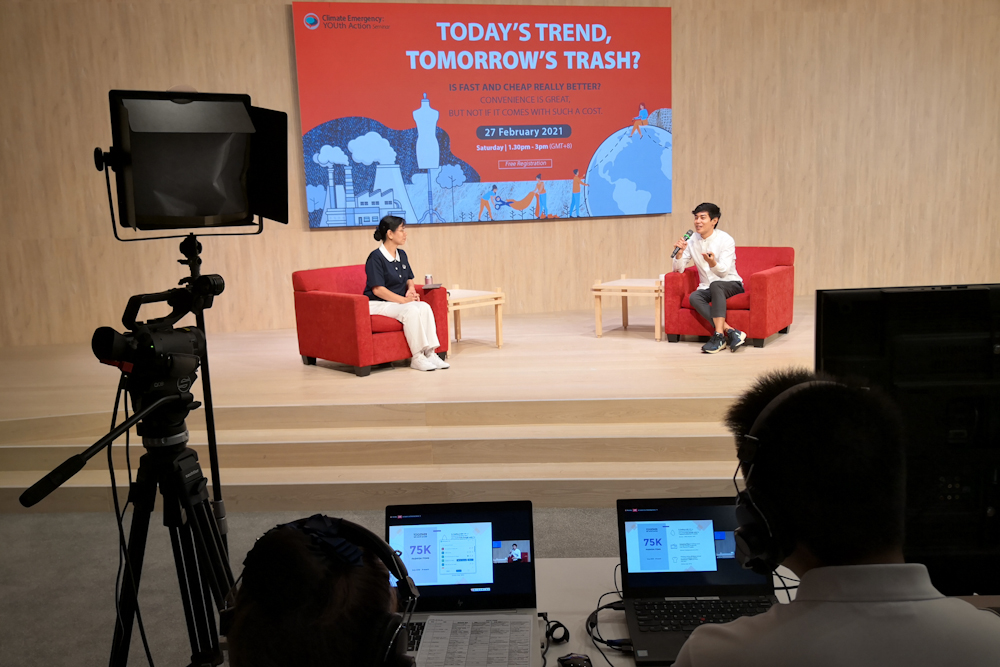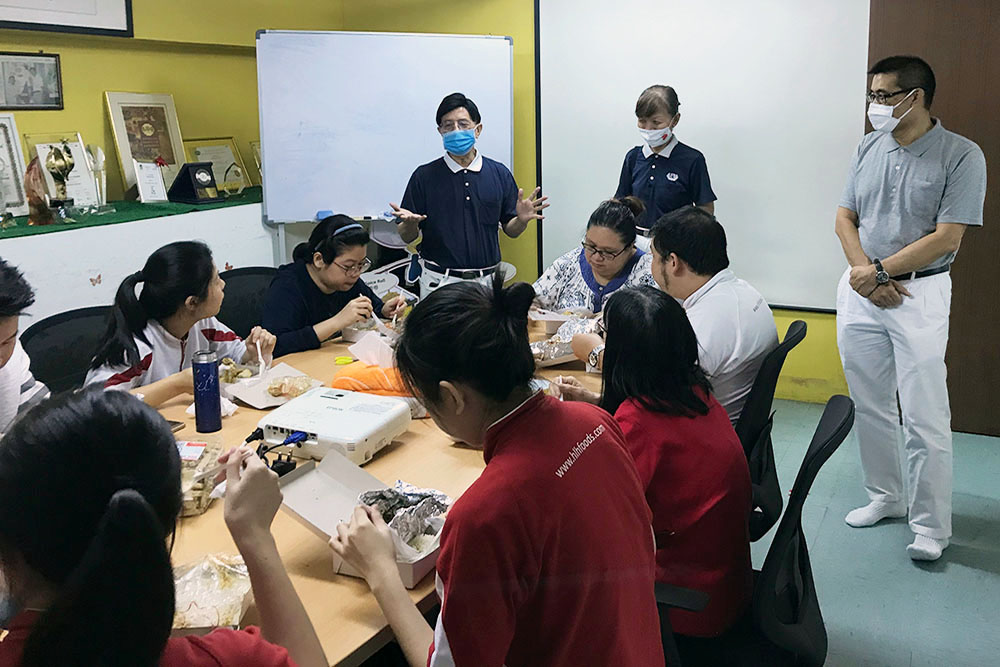
Out of the three panellists, Mr Raye Padit (right) is the only one present at Tzu Chi Humanistic Youth Centre's Great Hall with the moderator, Susan Tan (left).
As consumers’ demand for clothes increases globally, there is now a growing market that produces cheap apparel and this new style is taking a toll on the environment. With it, fashion production accounts for 10% of global carbon emissions and has been one of the main reasons for the pollution of water bodies. According to the United Nations, it estimates that manufacturing a single pair of jeans requires a kilogram of cotton. And because cotton tends to be grown in dry environments, producing this kilo requires about 7,500–10,000 litres of water. That’s about 10 years’ worth of drinking water for one person.
On 27 February 2021, Tzu Chi Humanistic Youth Centre held its third youth webinar titled “Today’s Trend, Tomorrow’s Trash?” to discuss the rising problem of fast fashions via Zoom as well as YouTube broadcast. This time around, the topic itself is a clear reflection of how most people have been wearing their clothes which has turned into an imminent crisis for the planet.
Incorporating Sustainability into Fashion
During the webinar, Mr Raye Padit, CEO of The Fashion Pulpit shared that fashion is not just about the glitz, glamour and red carpet, there is more behind the scenes that most are unaware of. While the fashion industry is fun to be immersed in, Mr Raye soon discovered that the fashion industry is contributing to 10% of global carbon emission, making it one of the most polluting industry in the world. With the increased production of apparels, 92 million tons of solid waste is produced each year by the fashion industry. He shortly came to the realisation that fashion today has devalued the true meaning of clothes as it has been very transactional and disengaging between the clothes and owners. Mr Raye soon found his calling as he sought to be part of the solution to the problem in the fashion industry, hence he founded The Fashion Pulpit, a non-profit organisation that aims to educate and spread awareness to individuals on how they can change the fashion industry.
However, it was not a smooth journey as he had to recreate a new way to incorporate sustainability into the fashion industry he is in. And fast forward to now, The Fashion Pulpit has a permanent store as Mr Raye received positive feedback from clothes swapping events he once held. And in two years, 75,000 fashion items were saved.
“Human and animal rights are some of the major challenges in the apparel industry but clothing waste is something hit closer to home,” Senior Sustainability Executive of UNIQLO Singapore, Ms Atiqah Abdullah shared.

Ms Atiqah from Uniqlo Singapore shares about Uniqlo's sustainability policy and ways to reduce clothing wastage with the audience via Zoom.
“UNIQLO has adopted the sustainability mission statement to turn the power of clothing into a force for good.” Ms Atiqah then added that UNIQLO Sustainability focuses on People, Planet, and the community and is not just a concept. According to UNIQLO Sustainability, it is included in every step of the production and it starts from getting feedback and understanding the consumers' needs. As such, UNIQLO products range consist of basic items like jeans and polo T-shirt that will never go out of season, thus able to be constantly sold.
Little Efforts from us, Great Impact on our clothes
“If you have clothes that are in good condition, you can consider swapping or circulating it among your friends and family to maximise the existence of the clothes and also there are organisations like Green Collective that collect back the clothes,” Mr Raye shared his perspective during the question and answer session.
During the session, the panellists each shared ways on how we could treasure the apparels we have and prolong the lifespan of the clothes. Likewise, Ms Atiqah added that there are also many retail brands like Zara, H&M and UNIQLO that are having initiatives to aid the collection of their unwanted clothes.
Ms Atiqah and Mr Raye also advise youths to read the labels of their clothes and understand the materials of their clothes, before preferably washing at a lower temperature. For youths who are artistically inclined, they even suggested that upcycling their clothes into something useful is one possibility that should not be ruled out. However, Mr Raye emphasises that one would need good quality materials and certain skills to upcycle successfully. He said that it is important to be mindful of this concept because more wastes could be generated if one buys low-quality materials to upcycle and ended up seeing the upcycled item deteriorating very fast, which defeats the purpose of upcycling.
Before moving on to the final section of the seminar, the moderator, Sister Susan also shared her opinion on how to tackle impulse online shopping by parking what we want to buy in a wishlist before coming back 3 days later to see if we really need it.
Making a Difference Starts with you

The third panellist, Sister Lu Xiao Yan (on the left of the screen) is a District Eco Team Leader for Environmental Protection Tzu Chi Singapore.
Just before the end of the session, every panellist called for all individuals to take action and play a part in having more sustainable fashion practices. Mr Raye revealed that despite climate change being an overwhelming topic for most youths, we must still ask ourselves what value do we stand for and whether the business matches our value. Ms Atiqah then further emphasises that we, the consumers, have the power to influence the changes among the retailers when we first think about an alternate use for the things that we want to dispose of.
“Fashion is how we represent ourselves to others, and what we want to show other people is more than what we wear, but more on how we talk and act. We must rethink how our lifestyle and apparels impact the environment and we must start to make adjustments,” revealed third panellist, Sister Lu Xiao Yan, the District Eco Team Leader for Environmental Protection Tzu Chi Singapore.
The Climate Emergency: YOUth Action seminar not only served as a reminder to youths of the pressing environmental issues brought about by fast fashion but also enabled them to realise that the little actions they take in their life can easily have great impacts on the environment and to the people around them.
“No matter how materially rich we are, if we have endless wants and desires, we will have endless suffering.”
Sister Lu ended with a Jing Si Aphorism by Dharma Master Cheng Yen that is familiar to most. Everyone needs to start from themselves and cherish the blessings we have.



